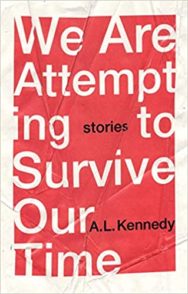‘Compassion is Kennedy’s strong suit. Throughout this collection she traces psychological cracks to their sources, engaging our empathy.’
A.L. Kennedy is one of Scotland’s most thought-provoking contemporary writers, and with her new short story collection, We Are Attempting to Survive Our Time, Lee Randall finds a writer wholly engaged with how we navigate our turbulent times.
We Are Attempting to Survive Our Time
By A.L. Kennedy
Published by Jonathan Cape
And the prize for most presciently titled anthology of the year goes to. . . A.L. Kennedy, for We Are Attempting to Survive Our Time, thirteen stories encompassing a range of historical and emotional landscapes, finely wrought, and full of Kennedy’s trademark wisdom and wry humour.
In a 2006 talk at Edge Hill University (transcribed by Ailsa Cox and Andrew Oldham), Kennedy said, ‘The thing about the short story is that yes, it is small, but it is small in a way that a bullet is small.’
Getting it right means forging immediate emotional connections and capturing moments of penetrating intensity that are—as in life—fleeting yet life-altering. Kennedy said a story should ‘[chime] with the reader because you’ve made it perfect enough that it resonates before and after itself. The people arrive and it’s as if they were alive forever beforehand and the people leave and it’s as if they’re going off to the rest of their lives.’ It demands ‘a really, really deep understanding of character point of view,’ and is a perfect description of her work.
The opening story, ‘Panic Attack‘, alerts us to pay attention. It’s about a wee man called Ronnie, whose every movement is designed to make you notice he’s there, taking up space. He exudes menace to onlookers as well as readers, and seems to be fighting to keep himself in check. Those gathered at Kings Cross, waiting for their trains to be announced, give him a wide berth, but we are trapped with him and inside him, and the edginess intensifies.
Compassion is Kennedy’s strong suit. Throughout this collection she traces psychological cracks to their sources, engaging our empathy. While the narrator’s description of Ronnie’s performance of masculinity feels derisory, as his internal monologue unfurls, a different reading emerges. Kennedy reels us tighter still, then upends expectations. The anticipated darkness swoops in—but from an unexpected direction, forcing a rethink of who Ronnie is and how he got that way.
Standout stories for this reader include ‘Everybody’s Pleased to See You‘, which evokes warm fuzzy feelings about an atmospheric restaurant called The Salazar—until all of a sudden it doesn’t.
Kennedy’s technical dexterity is admirable. Her satire ripens like one of the expensive cheeses served by Mireille, Paul, Augustine, Frank, ‘who love you as good servants should.’ When the twist comes you’ll scurry back to the story’s beginning. It’s a playful yet pointed exposé of artifice that takes a wounding swipe at gentrification and at the Brexit mentality nostalgic for an idyllic Britain that only existed for an elite minority—at the expense of its minions.
There are stories set in our social-media-obsessed present, offering observations such as: ‘Everything now is itself and also a code that suggests a lifestyle,’ and this, about paint colours: ‘[they] would have been called Calf’s Tongue, or Tewksbury Moss, or similar things which suggested values and aristocracy.’ Other stories are set in and around World War II, connecting specifically with the pain of surviving—a theme that should resonate with fans of her novel Day.
‘Inappropriate Staring‘, set outside the gorilla enclosure at the Durrell zoo in the Channel Islands, finds a middle-aged woman eavesdropping on a mother-son conversation, alert to its racist overtones: ‘The man has a voice invented not so long ago, apparently with the sole intention of more perfectly expressing angry whiteness.’ She hears them ‘skirting around a definite longing to hate someone out loud.’ She takes in the push-pull of a parent and child, and the ticking bomb of a second rate man: ‘If he gets drunk enough, stoned enough, outraged enough—then he will be a trouble. He will be the kind of self-harm that hurts other people first.’
Kennedy doesn’t leave it there, but keeps twisting the kaleidoscope. We learn that our narrator is on the island to clear out her uncle’s house, about his positive influence on her early life, and his abrupt, upsetting departure. Coming to the island has re-opened wounds and unlocked secrets, forcing her to consider what’s in front of us but unseen, either deliberately or through innocent ignorance. Here, as in ‘Panic Attack‘, Kennedy shows that toxic behaviour always stems from hurt, fear, and sadness. She excels at balancing disdain with empathy, and even her racist has his humanity.
The title story, ‘We Are Attempting to Survive Our Time‘, comes last, concluding the book on a cautiously hopeful note. We arrive atop a steep church tower in a foreign country, in the middle of a screaming argument between a holidaying British couple. Kennedy conjures a potent cringe. We’re in the woman’s perspective, she’s both having the fight and outside of it, analysing every word and her reactions, painfully aware of the discomfited tourists bearing witnesses. (Anxiety is the spine of this collection, and Kennedy excels at making our hearts beat a little faster.)
There are some beautiful observations. The narrator wonders, ‘Are we breaking up?’ Then she zooms from the enormous to the specific, as you do: ‘And I don’t know how we’d manage another night here being in the same hotel room, the same bed. The flight home has our seats booked, seats together. His other shoes are in my bag and will not fit in his bag, because he won’t ever travel with an adequate size of bag.’
The story’s redemptive message—the whole collection’s—is that present hurt is fuelled by historic hurt. There is context for everything. How can we keep the past from poisoning our present? Perhaps by daring to hope for the best, striving to be good, and endeavouring to look out for one another. As the story’s refrain suggests, progress is achieved in baby steps: ‘Tiny, tiny. Gentle, gentle. Lucky, lucky.’
We Are Attempting to Survive Our Time by A.L. Kennedy is published by Jonathan Cape, priced £16.99.
ALSO IN THIS ISSUE

 Lee Randall Reviews: We Are Attempting to Survive Our Time
Lee Randall Reviews: We Are Attempting to Survive Our Time
‘Compassion is Kennedy’s strong suit. Throughout this collection she traces psychological cracks to …

 An Appreciation
An Appreciation
‘Edwin Morgan’s legacy is one of peace, love, and understanding and it’s one we would do well to hee …













